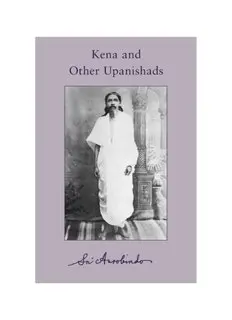
Kena and Other Upanishads - Sri Aurobindo Ashram PDF
Preview Kena and Other Upanishads - Sri Aurobindo Ashram
18 Kena and Other Upanishads VOLUME18 THE COMPLETE WORKS OF SRI AUROBINDO ©SriAurobindoAshramTrust2001 Published by Sri Aurobindo Ashram Publication Department Printed at Sri Aurobindo Ashram Press, Pondicherry PRINTEDININDIA Kena and Other Upanishads ii Publisher’s Note ThisvolumecomprisesSriAurobindo’stranslationsofandcom- mentaries on Upanishads other than the Isha Upanishad. (His writings on that Upanishad appear in Isha Upanishad, volume 17 of THE COMPLETE WORKS OF SRI AUROBINDO.) It also in- cludes his translations of later Vedantic texts and writings on the Upanishads and Vedanta philosophy in general. The volume is divided into three parts. The first consists of translations and commentaries that were published during Sri Aurobindo’s lifetime. The pieces in this part, along with his final translation of and commentary on the Isha Upani- shad,arehismostmatureworksofUpanishadicinterpretation. The second and third parts consist of material from Sri Auro- bindo’s manuscripts. The second includes early translations of the Prashna, Mandukya, Aitareya and Taittiriya Upanishads, andincompletetranslationsofandcommentariesonsomeother UpanishadsandVedantictexts.Thethirdpartcomprisesincom- plete and fragmentarywritings on the Upanishads and Vedanta in general. All the texts have been checked against the relevant manu- script andprinted versions. Guide to Editorial Notation ThecontentsofPartsTwoandThreeofthisvolumewerenever prepared by Sri Aurobindo for publication. They have been transcribed from manuscripts that sometimes present textual difficulties.Inthiseditiontheseproblemshavebeenindicatedas far as possible by means of the notation shown below. Notation Textual Problem [.......] Word(s)lostthroughdamagetothemanuscript(at the beginning of a piece, sometimes indicates that a page or pages of the manuscript have been lost) [word] Word(s)omittedbytheauthororlostthroughdam- agetothemanuscriptthatarerequiredbygrammar or sense, and that could be supplied by the editors [ ] Blank left by the author tobefilled inlaterbut left unfilled, which the editors were not able to fill [note] Situations requiring textual explication; all such information is printed in italics CONTENTS Part One Translations and Commentaries Published by SriAurobindo Kena Upanishad 3 Katha Upanishad 99 Mundaka Upanishad 129 Readings in the Taittiriya Upanishad 149 Part Two Translations and Commentaries fromManuscripts Section One. Introduction On Translating the Upanishads 163 Section Two. Complete Translations (circa1900–1902) The Prusna Upanishad of the Athurvaveda 175 The Mandoukya Upanishad 193 The AitereyaUpanishad 197 Taittiriya Upanishad 206 Section Three.Incomplete Translations and Commentaries(circa 1902–1912) Svetasvatara Upanishad 235 Chhandogya Upanishad 250 Notes on the Chhandogya Upanishad 258 The Brihad Aranyak Upanishad 268 The Great Aranyaka: ACommentary on the Brihad Aranyak Upanishad 273 The Kaivalya Upanishad 288 Nila Rudra Upanishad 290 SectionFour. Incomplete Commentaries onthe Kena Upanishad (circa1912–1914) Kena Upanishad: An Incomplete Commentary 297 A Commentary on the Kena Upanishad 311 Three Fragments of Commentary 313 Kena Upanishad: A Partial Translation with Notes 315 CONTENTS Section Five. Incomplete Translations of Two Vedantic Texts(circa 1900–1902) The Karikasof Gaudapada 319 Sadananda’s Essence of Vedanta 330 Part Three Writings on Vedanta Four Fragments 337 The Spirit of Hinduism 340 The Philosophy of the Upanishads 345 An Incomplete Work of Vedantic Exegesis 400 The Religion of Vedanta 413 Evolution in the Vedantic View 414 The Meansof Realisation 421 A FragmentaryChapter for a Work on Vedanta 424 God and Immortality 433 Part One Translations and Commentaries Published by Sri Aurobindo These texts were first published between 1909 and 1920. Sri Aurobindo later revised most of them. The revised versions areprintedhere.
